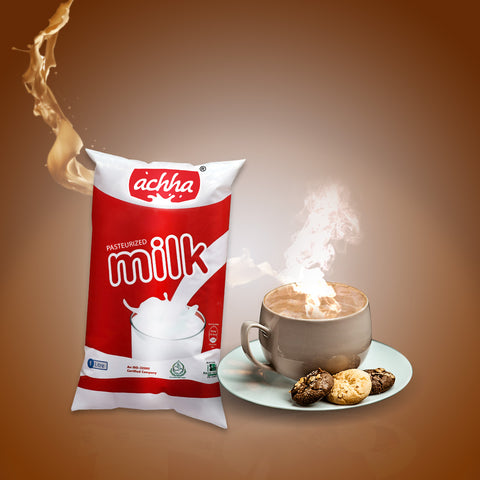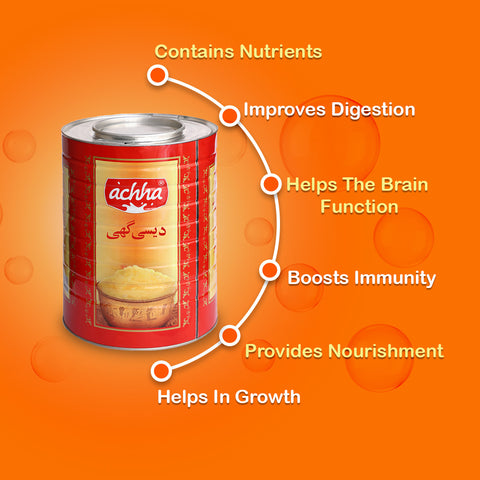Steeped in Tradition: The Fascinating History of Chai in Pakistan
In the heart of Pakistan's vibrant and diverse civilization, a celebrated yet revered beverage has etched a special place for itself. This beloved drink, known as 'chai,' is more than just a beverage; it's a timeless custom and a cultural cornerstone that has been steeped in the lives of Pakistanis for generations. As you sip a cup of chai in the bustling streets of Karachi, the serene valleys of Murree, or the historic lanes of Lahore, you become part of a rich tapestry of tea culture that stretches back in time to the days of the British Raj. Achha Foods is diving deep into the history of Chai to tell you exactly what made this delicacy the “King of all Beverages”
Chai often enjoyed with milk, sugar, and an aromatic blend of spices, surpasses mere refreshment. It's a symbol of hospitality, a shared moment of connection, and a reminder of the warmth and charm that characterize Pakistani hospitality. We welcome you to join us in this article as we embark on a journey to unveil the enchanting history and cultural importance of chai in Pakistan.
- Introduction of Tea: Tea was introduced to the subcontinent, including present-day Pakistan, during the British colonial era in the 19th century. The British East India Company played a significant role in boosting tea cultivation and consumption. It led to curiosity in the people of this region about this specific cultivation and its use.
- Early Tea Plantations: The first tea plantations in Pakistan were established in the area now known as Khyber Pakhtunkhwa. The British established tea estates in the northern parts of the country, taking advantage of the region's hilly topography and advantageous weather for tea cultivation.
- Emergence of Local Tea Culture: Over time, tea became popular among the local population. The traditional way of brewing tea in Pakistan is quite different from the British style of tea consumption. In Pakistan, tea is usually intense, strong, and heavily brewed, often flavored with spices like cardamom or cinnamon, and served with milk and sugar. This type of tea is referred to as "doodh patti" or "chai."
- Dhabas: Tea culture in Pakistan is closely associated with dhabas (roadside eateries) and small tea stalls. These small facilities serve as social hubs where people gather to enjoy tea, engage in discussion, and watch the world go by.
- Social Bond: Chai plays a central role in Pakistani hospitality. It is habitual to offer guests a cup of tea as a gesture of keenness and welcome. The practice of serving tea to guests is deeply instilled in Pakistani culture.
- Tea Varieties: Pakistan mainly imports tea, and various brands and blends are available in the market. While black tea is the most common, green and different-flavored teas are also gaining popularity, especially among health-conscious people.
- Tea in Pakistani Cuisine: Tea is often enjoyed with classic Pakistani snacks, such as samosas, rusks, pakoras, and parathas. It is an essential part of breakfast and evening gatherings.
- Economic Impact: Pakistan's tea industry has evolved over the years, and the country now produces a significant amount of tea, primarily in Khyber Pakhtunkhwa, Azad Jammu, and Kashmir. These tea plantations contribute to the local economy and provide employment opportunities.
- Rituals and Celebrations: Special occasions, such as weddings and religious gatherings, often include meticulous tea-serving practices. Traditional teas, like Kashmiri chai and kahwa, are prepared for festive events.
In contemporary Pakistan, the love for tea remains resolute. The advent of tea bags and the popularity of tea houses and cafes have added a modern twist to the traditional tea culture. Tea is also commonly devoured at offices, schools, dhabas, staples, social gatherings, and homes.
Chai has become more than just a beverage in Pakistan; it symbolizes hospitality, a social connector, and an essential part of daily life. Its history is deeply intertwined with the country's cultural fabric, making it an integral element of Pakistani society. Achha Foods celebrates the diversity of this drink by blending it with its pasteurized milk because it’s an unbreakable bond of nutrition and enjoyment.




